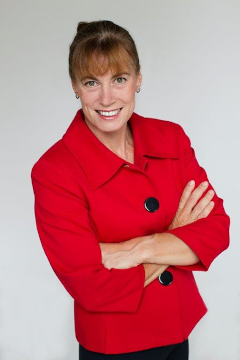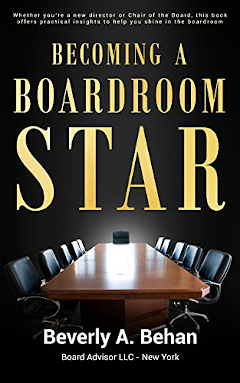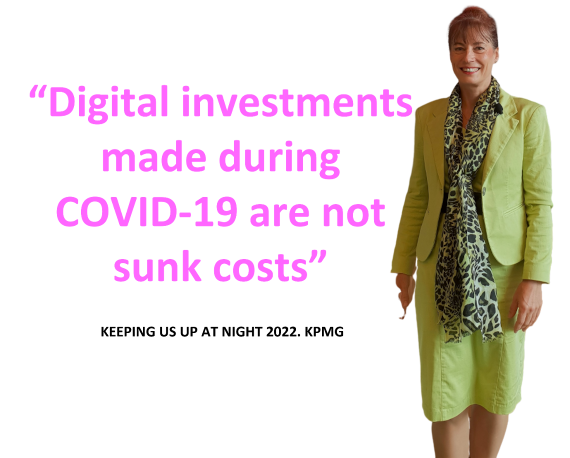|
|
|
|
|
|
|
|
|
Dear reader,
Welcome to The Director's Dilemma February 2023
It is now over 15 years since I started sharing these dilemmas with directors and governance practitioners around the world and, so far, there seems to be a never-ending supply of new and interesting decisions to test our thinking capabilities.
Each month this newsletter looks at a real-life scenario that happened to a board, perhaps to a board like yours, and considers a range of responses. The scenarios are de-identified to protect the individuals concerned. This month we consider the implications of directors acting in their own companies' interests rather than those of a social enterprise.
Of course, these scenarios are general, I work with boards and directors as a confidential mentor to help them build great companies and maximise their impact. If you would like personalised service, please call me.
To read this email in a web browser, go to www.mclellan.com.au/newsletter.html and click on 'read the latest issue'. I hope you will enjoy the latest dilemma:
 Zane sits on the board of a small, yet ambitious, for-profit social enterprise called Employed. He is very excited about Employed's mission and the way in which the company is able to create positive change in the local community through its recruitment business where it supports companies that recruit people of culturally or diverse backgrounds and returns 50% of the profits back into the community. He is proud of the organisation's Social Traders Accreditation and BCorp certification. The board of directors are all volunteers. Zane also runs his own social enterprise, called Bud, that manages a community garden staffed by
refugees. Zane sits on the board of a small, yet ambitious, for-profit social enterprise called Employed. He is very excited about Employed's mission and the way in which the company is able to create positive change in the local community through its recruitment business where it supports companies that recruit people of culturally or diverse backgrounds and returns 50% of the profits back into the community. He is proud of the organisation's Social Traders Accreditation and BCorp certification. The board of directors are all volunteers. Zane also runs his own social enterprise, called Bud, that manages a community garden staffed by
refugees.
The board is composed of a majority of directors who are CEOs of other social enterprises and who are all friends. This seemed like a good thing when Zane joined but he has noticed that when the CEO of Employed calls upon a director to help with a sales pitch the director will often somehow come away having secured some business for his or her own company. Worse, the opportunities are sometimes directly contracted rather than through Employed.
Zane knows that this is a conflict of interest and that the directors could be accused of misusing their positions to gain an advantage for themselves or their companies.
When he raised the matter with the Chair, however, he was told that this was just how things were, and that it would be impossible to prevent without fracturing the board's collegiality. After all, directors are unpaid for their board work.
Zane knows that this practice could undermine the reputation of Employed and damage the social enterprise sector's reputation. He also recognises that it will be contentious to discuss with his fellow directors.
How should he proceed?
|
|
|
|
Marcella's Answer

Zane is right to be concerned about the perceived conflict of interests that are occurring and talking to the Chair was a good first move. Zane could proceed by suggesting to the Chair that the Board Directors all take part in a governance workshop, which they should do annually anyway. Zane could offer to take this on as his responsibility to organise and then confidentially brief the governance workshop facilitator about the conflict-of-interest dilemmas and ensure that it is featured in the workshop. It may be more palatable for the other directors to hear about conflict-of-interest best practice from a neutral governance expert rather that from Zane.
Like any small business, it is possible that many of the directors are not aware of their director's duties and not trained in governance. Directors need to be vigilant in checking which hat they are wearing eg. own business CEO or Employed Director at any meeting and not mix them up or try and wear both at the same time. The workshop would remind the directors that there may be negative repercussions for Employed and the social enterprise sector in general, as many government agencies that use social enterprises have procurement policies that ban conflicts of interest.
In the meantime, Zane could make sure that the Board Meeting Agenda includes an item where each director's interests are listed before covering the agenda items. This will keep it front of mind at each meeting. Zane has a responsibility to raise his concerns whenever he perceives that there may be a conflict of interest, no matter how uncomfortable that may be. Zane may benefit from a coach or mentor with board experience who could advise him on how to raise his concerns in a constructive way at board meetings.
Marcella Lazarus GAICD, PCC, CAHRI is a board director, executive coach, and business owner with experience in the Social Enterprise sector. She is a director and chair of the nominations committee for the Social Enterprise Council of NSW & ACT (SECNA), and Founder and Managing Director of Growing Organisations. She has bases in Sydney, Australia and Berlin, Germany.
|
|
|
|
Julie's Answer

It is difficult to be a new person joining an established group, especially if you criticise the way the group has operated until now.
The Chair's response to a real governance issue with potential to undermine the reputation and possibly even the future viability of the enterprise is unacceptably lax. But, it has served a useful purpose by putting Zane on notice that his opinion may be threatening and needs to be voiced carefully.
Zane should check the constitution and any charter, code of conduct, etc. for specifics on how this enterprise reports, records, and handles conflicts of interest.
Zane should arrange a quiet coffee to find out 'how things are going' and talk through the history of items on the board agenda with the CEO.
Over that coffee, Zane can ask the CEO about the behaviour he has observed and its impact on the company and the CEO's ability to achieve objectives.
Zane should also reach out to the minority of directors who are not CEOs of similar social enterprises and ask them what they observe to be the board's strengths and weaknesses.
All of this is data gathering. He should be careful to ask and acknowledge rather than to opine or judge. When he knows how each director feels about the issue, he can start to plan how to place it on the board agenda in a way that will encourage an open discussion and improved behaviour rather than a heated argument and fractured relationships.
Zane must act, but he must act strategically.
Julie Garland McLellan is an experienced non-executive director and board advisor based in Sydney, Australia. She travels the world providing director education and board development.
|
|
|
|
Sandra's Answer

Zane has joined the Board as an independent Board Member. The objective of any Board Member is to put the needs of the company / organization before their own interests and provide support so that the organization can reach its goals and achieve its mission. It is unethical for a Board Member to profit by taking advantage of their position since that sabotages the company they were named to provide leadership and oversight to. Quick and simple.
Having said this, the matter that Zane has picked up on is very complex and goes directly against the principles stated above. Also, if word about this gets out his reputation could be damaged.
Clearly, many Directors have been profiting because of their positions on the Board and this is a potential contingency in the future. The reputation of the social enterprise is at stake, as is the reputation of all the members of the Board.
My advice would be to put this issue on the agenda of the next Board meeting and explain there that this behaviour is not compatible with sitting on the Board and try to get them to commit to abstaining from participating in any business that comes from the social enterprise in the future. If the situation repeats itself, I suggest that Zane step down from the Board to avoid damaging his reputation.
Also, he may need to report these actions to avoid a possible lawsuit against him in the future.
Sandra Olive is a Chair at Vistage, Advisory Board Member at FAME (Argentine Forum of Executive Women), on the AESC LATAM Diversity Leadership Council, Member of the Employment Community at Adhra (Argentine Human Resources Association) and an active Member of IDEA. She is based in Buenos Aires, Argentina.
|
|
|
|
Julie's News - January is always a lovely quiet time in Sydney. Last year I managed to get Covid and was out of action for a while. I'm now fully back to health and enjoying the pick up in activity as Australia starts to return to business as normal.
Do you like video? - Readers who follow me on LinkedIn may have noticed that I have been posting short video insights. You might like to visit and subscribe to my YouTube channel to see a link to the channel whenever you visit YouTube. The videos are in three lists:
-
'Quick Insights' up to three minutes long
-
'Board Thoughts' three to ten minute informal comments giving my take on current board issues, and
-
'Presentations and Classes' up to an hour long.
Choose how much time you want to invest. Let me know if there are any topics you would like to see addressed.
Book Review - Becoming a Boardroom Star by Beverly Behan.

Most boards can confidently point to their 'star performers'. Most boards quail at the prospect of identifying and addressing their less than stellar performers. Which means that if you want to become a star, you will have to work on your own performance.
This is the only book I have found that addresses how to have a positive impact on a board and how to stand out as an individual and rather than how to improve the board as a whole.There will be something in this book that even the best directors can use to keep improving; if you are struggling or new to the role, the whole book will be a great help.
It is practical and full of ideas that any director can apply immediately as well as many ideas that will continue to resonate for months after you have finished reading it.
For people who like a more experiential learning process there is also an online course that takes you through the book, chapter by chapter.
Available at Amazon.com
Inspirational quote for February

We read a lot about 'digital transformation'. If we haven't transformed already, we are probably already casualties of the transformation of others. Getting value from the investments we have already made is essential. Companies that slide back into old ways of doing things as the Covid crisis passes (or as we hope it passes) are following a recipe for failure. Directors need to continue their digital journey not go back to the start.
Do you know where to focus your director and board development? - boards often struggle to get cut through and drive company performance. They work hard, then they work harder, then call in a consultant who recommends some changes, then they work harder still.
If that sounds like your board, don't worry. It is likely that you have simply been focusing on the wrong stuff. I have made a diagnostic tool that might help you to prioritise the actions that will free your board from the drudgery and allow you to maximise your impact. You can take the diagnostic here:
https://directorsdilemma.scoreapp.com
Call me afterwards for a personalised action plan to revitalise and enhance the impact of your board work.
A note on names - A few readers have asked me where I find the names for the protagonists in each case study; I 'borrow' them from people I meet or things that I read. Zane is an old name that means "God is Gracious". Our protagonist, without letting this issue continue unremedied, must be gracious and cautious to bring the board together to a solution.
This newsletter - If you have any ideas for improving the newsletter please let me know. If you are reading a forwarded copy, please visit my website and sign up for your own subscription.
Let me help you - I would be delighted to speak for or train your board, staff, audience and/or group. If I can help, please contact me at julie@mclellan.com.au.
Suggestions for dilemmas - Thank you to all the readers who have suggested dilemmas. They are greatly appreciated. I will answer them all eventually. I could not write this newsletter without your help and without the generous help of all the experts who respond each month to the case studies.
Be a contributor - if you would like to attempt a response to the dilemmas for publication you will be most welcome. Simply reply to this email and let me know. I am always on the lookout for new talent from around the world so please reach out if that sounds like something you could do. I am also always grateful for the generous sharing of the current and past contributors. I couldn't create such an engaging newsletter without their help.
Let's connect - I use LinkedIn to share information about boards and directorship with my friends and acquaintances. If you use LinkedIn and we are not yet connected I will welcome a connection from you. You can find me at linkedin.com/in/juliegarlandmclellan.
Farewell until the next issue due 1 March. I look forward to greeting you again then. Best wishes for a successful 2023.
Enjoy governing your companies!
Best regards,
Julie

Main photo by Fauxels from Pexels.com
Quote illustration by Julie Garland Mclellan
Disclaimer: The opinions expressed above are general in nature and are designed to help you to develop your judgement as a director. They are not a definitive legal ruling and do not constitute legal advice. Names and some circumstances in the case study have been changed to ensure anonymity. Contributors to this newsletter comment in the context of their own jurisdiction; readers should check their local laws and regulations as they may be very different.
Privacy: I am privileged to have your contact details and keep them as safely as possible. I will alert you if they are ever accessed by any unauthorised person (the technical staff at ayuda help with publishing and issuing the Director's Dilemma and have access so they can send the newsletters to you). I do not sell your details to anyone; they are kept only for the intended purpose - sending you this newsletter and helping to build the judgement of company directors by providing a safe way to consider potential responses to real life events.
|
|
|
|
|
|
|
 Zane sits on the board of a small, yet ambitious, for-profit social enterprise called Employed. He is very excited about Employed's mission and the way in which the company is able to create positive change in the local community through its recruitment business where it supports companies that recruit people of culturally or diverse backgrounds and returns 50% of the profits back into the community. He is proud of the organisation's Social Traders Accreditation and BCorp certification. The board of directors are all volunteers. Zane also runs his own social enterprise, called Bud, that manages a community garden staffed by
refugees.
Zane sits on the board of a small, yet ambitious, for-profit social enterprise called Employed. He is very excited about Employed's mission and the way in which the company is able to create positive change in the local community through its recruitment business where it supports companies that recruit people of culturally or diverse backgrounds and returns 50% of the profits back into the community. He is proud of the organisation's Social Traders Accreditation and BCorp certification. The board of directors are all volunteers. Zane also runs his own social enterprise, called Bud, that manages a community garden staffed by
refugees.





